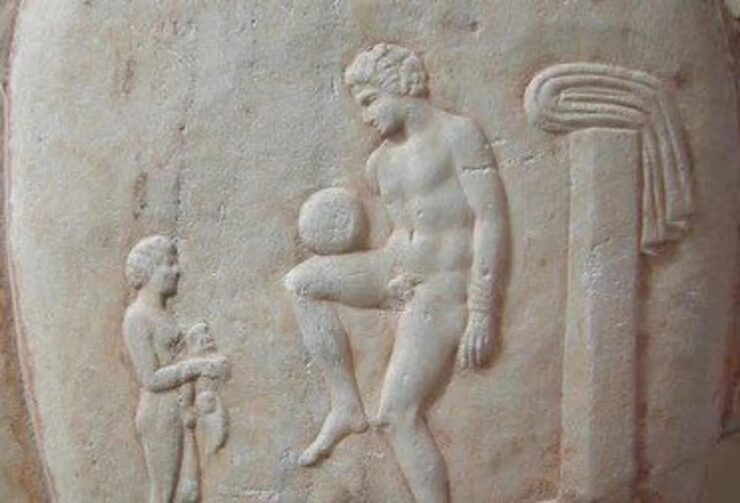A relief on display at the National Archaeological Museum in Athens, Greece, depicts a young man training in ancient Greece while holding a football balanced on his thigh in front of a little child. This indicates that football is at least 2,400 years old and presumably has its roots in ancient Greece, albeit in a primitive form.
One could say that the parent appears to be teaching his youngster how to control the ball like an ancient Greek Lionel Messi while looking at this beautiful old relic nowadays.
According to the news of Greek Reporter, archaeologists date the picture of the man playing with the ball to the third quarter of the fourth century BC (400-375 BC).
The name of the sport in ancient Greece was Episkyros. A football game called episkyros was played in ancient Greece between two teams, each with twelve to fourteen men, and one ball. At the time, the game’s regulations permitted the use of hands.
Tossing the ball over the opposing team’s heads was the goal. Between the teams, there was a white line known as the skyros, and there was also a white line behind each team.
The ball would frequently change sides until one team was forced behind the goal line at their end. During an annual city fair in Sparta, a version of the Episkyros game was played with five teams of fourteen players.
Later, the Romans took over Episkyros and and gave it the new name “harpastum,” which is a Latinization of the Greek word “harpaston,” which means “snatching” (the ball).
As European powers switched and society evolved throughout the years, the remnants of Episkyros, the ancient Greek football, were lost. But just as the traditional Olympic sports have evolved into the contemporary forms we now witness, modern football is also adjusting to ever-changing standards and eras.
In light of the fact that episkyros was the origin of modern football, to borrow an English catchphrase, on July 4, 2004, football did actually return to Greece.
Henri Delaunay, a Frenchman, is the creator of the concept for a European nations cup. In an interview in September 2005, Delaunay explained. “Europe is a word of Greek origin, Europe certainly originated in the Mediterranean Basin, and Greece invented the Olympic Games.”
The fact that the UEFA Euro occurs every four years could also be related to the fact that both the modern and ancient Olympic Games are held every four years. The fact that Pierre Delaunay decided to have the Euro in the same year as the Olympics is obviously no coincidence.
